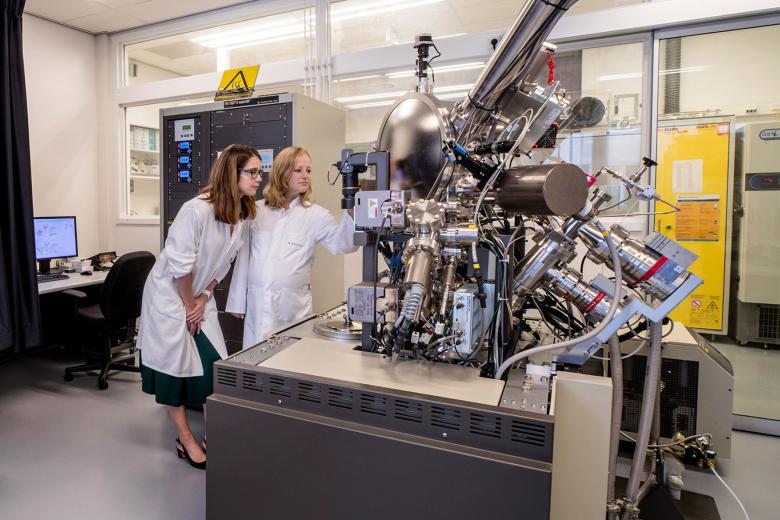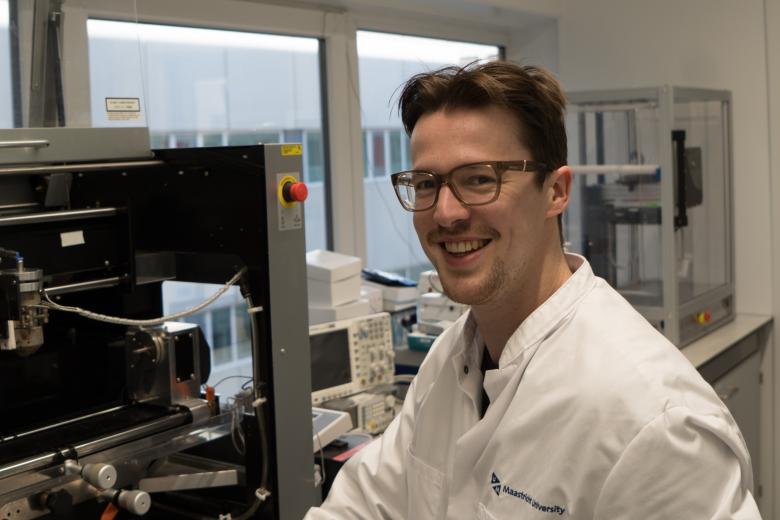"I didn’t become a doctor, but as a postdoc, I hope to help many more patients."
Most people who study medicine see themselves becoming doctors later on. Robin Peeters consciously chose a different path. After completing her bachelor’s degree in medicine, she switched to a master’s in health policy and management. An unexpected choice, but one that brought her to where she is today. After finishing her PhD research, Peeters enthusiastically started working as a postdoc. Collaboration is often seen as the holy grail in healthcare. But is it really? That is the central question in her postdoctoral research. As part of Postdoc Awareness Week, Peeters shares more about her work as a postdoc.
Robin Peeters completed a bachelor’s degree in medicine, followed by a master’s in Healthcare Policy, Innovation and Management. She now works as a postdoctoral researcher at CAPHRI, part of the Faculty of Health, Medicine and Life Sciences. In early 2025, she obtained her PhD with the dissertation All That Glitters Isn’t Gold: Examining how and why organizations collaborate to address wicked problems in healthcare. Since then, she has been working as a postdoc on follow-up research into collaboration and networks in healthcare.
Not a doctor, but making an impact
When Peeters was 8 years old and most of her peers dreamed of becoming dolphin trainers, she already declared that she wanted to be a heart surgeon. Yet during her studies, she discovered that another path suited her better. “I realised I couldn’t be the kind of doctor I wanted to be. Moreover, I found it more enjoyable to think about the healthcare system in a philosophical and critical way than to acquire medical knowledge.” Her decision to switch to a different master’s rather than continuing with a medical degree raised questions. “People said: ‘But didn’t you want to be a doctor? Isn’t this your passion?’”
Yet Peeters feels her mission has succeeded. “I wanted to become a doctor to help people. But as a postdoctoral researcher, I can indirectly help many more people by improving the entire healthcare system. In doing so, I hope to contribute to better care on a larger scale.”
“I wanted to become a doctor to help people. But as a postdoctoral researcher, I can indirectly help many more people by improving the entire healthcare system.”
Collaboration in healthcare
Peeters enjoyed her PhD research so much that she is now continuing as a postdoctoral researcher. Her work, like her doctoral research, focuses on collaboration in healthcare. She explains: “We often see collaboration as the solution to everything: long waiting lists, high healthcare costs, limited accessibility, and so on. But my research shows that collaboration between organisations does not automatically lead to better care. Setting up networks in healthcare is incredibly complex. You’re creating an organisation of organisations. That takes a lot of time and money. That’s why we need to remain critical: who are we doing it for when we collaborate, and what do we actually gain from it?”
Out in the field
Peeters is grateful for all the opportunities she has had, both during her PhD and later as a postdoc. “In my work, I get to ask questions out of pure curiosity, gather information, and turn that into scientific publications. I feel very lucky that I get to do all the things I enjoy and call it my job.”
An average working week for Peeters is often a mix of computer-based tasks and being out in the field. “My postdoc research is very practice-oriented. That’s why I’m often on the move, mainly to observe meeting structures in regional networks and to interview those involved. I also collect survey data. It’s precisely this variety that makes my work enjoyable.” In addition, Peeters teaches in the master’s programme in Healthcare Policy, Innovation and Management and she also teaches medical students.
Rock climbing and renovating
Outside of work, Peeters can often be found at the rock climbing gym, although she prefers climbing outdoors even more, in Belgium, Luxembourg or mountain regions such as the Alps. In addition, she keeps herself busy with the renovation of the fixer‑upper she and her husband bought. “The interior was stuck in 1968, so there’s plenty to do. We’re trying to do things ourselves as much as possible. Luckily, my husband is handy. And me? I’m learning it as we go.”
Postdoc Appreciation Week
From 15 to 19 September 2025, the first Postdoc Appreciation Week of the Netherlands will take place. During this week, postdocs will be recognised and attention will be drawn to their valuable contribution to science.
Peeters welcomes the initiative. “Postdocs are in an uncertain position. There is plenty of work, but few permanent contracts or structural funding, which is why the outlook for postdocs in science can sometimes feel uncertain. That’s why it’s great that we get explicit recognition for the work we do.”
Text: Romy Veul
Photography: Joris Hilterman
Also read
-
UM to play a more prominent role in Dutch scientific infrastructure
Eleven consortia from various scientific disciplines are set to launch projects of great value to science. The Dutch government is making a total of €197 million available for this purpose. Scientists from Maastricht University (UM) are closely involved in seven of the eleven projects.

-
17 million for Dutch mega cohort: working together to build healthier ageing
MUMC+ is main applicant in the NCC: a unique research infrastructure with data from almost half a million Dutch citizens.
-
Letting bone and cartilage repair themselves
Tim ten Brink focuses on developing implants for damaged bone and cartilage, so eventually there is less need for invasive surgery.
